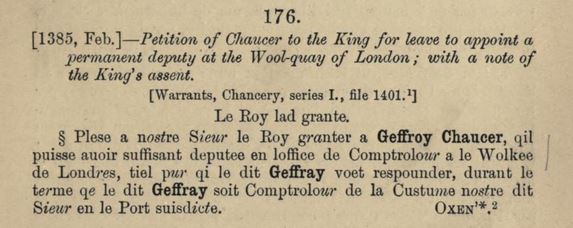In 1385 Geoffrey Chaucer, who held the office of controller of wool customs at London, requested permission from the king to appoint a sufficient deputy for as long as he held the office. The following is the text of his petition to Richard II preserved in the UK National Archives [C81/1394/87], published in Life-Records of Chaucer:

Life-Records of Chaucer, Part IV ed. R.E.G Kirk, London : Published for the Chaucer Society by K. Paul, Trench, Trübner & Co., 1900 .p.251
The brief notes to the text provide some basic information about the petition: that it is written in an ordinary chancery clerk’s hand, probably not written by Chaucer himself, and signed by the ninth earl of Oxford.
At this time Chaucer had been a London customs controller for about 10 years, having been appointed by Edward III to this minor but politically sensitive office. The controller acted as a royal check on the accounts of the collector of customs. An early biography of Chaucer describes the episode in an inventive and dreamy fashion. This is from Chaucer’s Life by Walter Skeat:
In 1385, a stroke of good fortune befell him, which evidently gave him much relief and pleasure. It appears that Chaucer had asked the king to allow him to have a sufficient deputy in his office as Comptroller at the Wool Quay (in French, Wolkee) of London. And on Feb. 17, he was released from the somewhat severe pressure of his official duties (of which he complains feelingly in the House of Fame, 652-660) by being allowed to appoint a permanent deputy. He seems to have revelled in his newly-found leisure; and we may fairly infer from the Prologue to the Legend of Good Women, which seems to have been begun shortly afterwards, that he was chiefly indebted for this favour to the good queen Anne.
In the 1920’s a new project to publish the Life Records was begun, with the aim to provide a foundation of primary sources on which biographers and historians could rely. This was eventually published in 1966 as Chaucer Life-Records. This edition provides extremely rich descriptions of all the documents printed, including the 1385 petition. There is a valuable discussion also of the operations of the customs service, and the types of records it produced.
Here are some of the descriptive details this edition includes: “the signature (with an asterisk) and the phrase Le roy lad grante are in another ink and in the same, contemporary, hand, much less formal than that of the record itself….”, the “notification of assent [Le roy lad grante] and the name Oxen below is probably that of Robert de Vere, the ninth earl of Oxford …. by this addition the record became a sufficient warrant for the sealing of the letters patent ….” [p. 169] The background provided by the editors further explain that permission to appoint a deputy for a controller was rare. As a writer of a counter-roll representing the king’s interests at the audit of the collector’s accounts, the controller was expected to perform his duties in person and must have done so. Chaucer however had been given permission to appoint a temporary deputy on a few occasions prior to this, because he was directed to perform other duties on behalf of the king.
The actual letters patent issued to the controller has not survived. However, the enrolment of this license on the Patent Rolls is in the UK National Archives [C66, 8 Ric. II, Pt. 2, m. 31]. The text of the enrolment is published in Chaucer Life-Records (p. 168-9):
Pro Galfrido Chaucer.
Rex omnibus ad quos etc. salutem. Sciatis quod de gracia nostra speciali concessimus et licenciam dedimus dilecto nobis Galfrido Chaucer contrarotulatori custumarum et subsidiorum nostrorum in portu civitatis nostre Londonie quod ipse officium predictum per sufficientem deputatum suum pro quo respondere voluerit facere et excercere possit quamdiu idem Galfridus in officio steterit supradicto absque impedimento collectorum custumarum et subsidiorum nostrorum predictorum in portu predicto pro tempore existencium (seu aliorum quorumcumque). In cuius etc. Teste rege apud Westmonasterium xvii Februarii.
Per ipsum regum
There is no evidence Chaucer used this permission to appoint a deputy, and lost the position the next year.
But I am not here especially concerned with the biography of Chaucer. In following posts I will describe the brief life of his petition.
Bibliography
Crow, Martin M. and Clair C. Olson, eds. Chaucer Life-Records. Oxford: Clarendon Press, 1966.